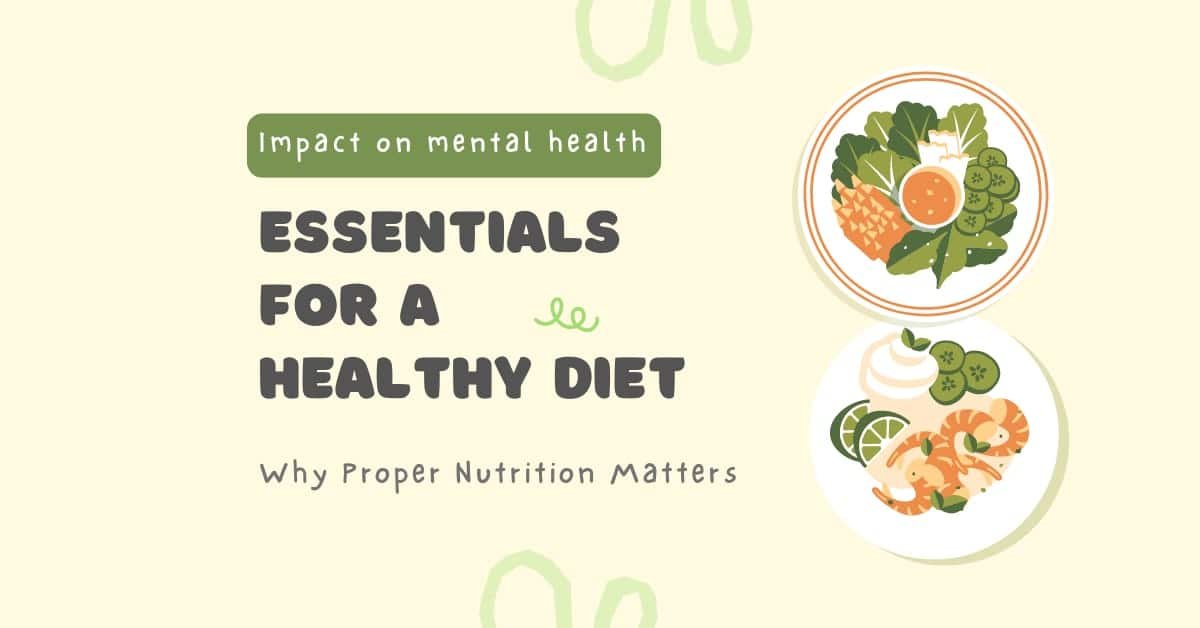Mental health is closely connected to the foods we eat. A growing field of study called nutritional psychology shows that our diet plays a significant role in how we feel. In fact, the diet impact on mental health can be profound, influencing mood, stress levels, and overall brain health. Choosing the right foods can provide a natural and effective way to enhance mental well-being and boost your mood.
Diet and Its Impact on Mental Health
Our mental health is shaped by numerous factors, including stress, sleep, and physical activity, but what we often overlook is how much diet impacts mental health. The brain requires essential nutrients to function optimally, and deficiencies in these nutrients can lead to mood swings, anxiety, and even depression. By incorporating mood-enhancing foods into your diet, you can experience noticeable improvements in how you feel.
Mood-Enhancing Foods: What to Eat for Better Mental Health
Let’s explore some of the best foods you can add to your diet to support your mental health and boost your mood.
1. Fatty Fish (Salmon, Mackerel, Sardines)
Fatty fish are packed with omega-3 fatty acids, which are crucial for brain health. These healthy fats support the function of serotonin, a neurotransmitter that promotes happiness. Omega-3s are known to reduce symptoms of depression and improve overall mood.
2. Leafy Greens (Spinach, Kale)
Dark leafy greens are rich in vitamins for mental wellness, especially folate, which helps produce dopamine—a feel-good chemical in the brain. Low levels of folate are linked to depression, making these greens a key part of a mental health diet.
3. Berries (Blueberries, Strawberries, Raspberries)
Berries are full of antioxidants, which protect the brain from oxidative stress. This can reduce inflammation in the brain and improve cognitive function, leading to better mental clarity and a more stable mood.
4. Nuts and Seeds (Walnuts, Flaxseeds, Chia Seeds)
These nutrient-dense foods contain a variety of brain-boosting nutrients, such as magnesium, zinc, and omega-3 fatty acids. Magnesium helps reduce anxiety, while zinc supports brain function, making them powerful mood-enhancing foods.
5. Dark Chocolate
Dark chocolate not only satisfies your sweet tooth but also contains compounds that can boost serotonin and endorphin levels, helping to improve mood. It also has antioxidants that enhance cognitive function.
6. Bananas
Bananas are an excellent source of vitamin B6, which aids in serotonin production. Eating a banana can help enhance your mood by stabilizing blood sugar levels and providing a natural energy boost.
7. Fermented Foods (Yogurt, Kimchi, Sauerkraut)
Probiotics found in fermented foods improve gut health, which in turn has a direct connection to the brain through the gut-brain axis. A healthy gut can reduce anxiety and depression, making probiotics a vital part of healthy eating habits for mental well-being.
The Role of Nutrition in Reducing Stress and Anxiety
Stress and anxiety are some of the most common mental health issues people face today. A balanced diet filled with mood-enhancing foods can help manage stress levels. For instance, foods rich in magnesium, such as leafy greens, nuts, and seeds, can relax the body and mind, reducing feelings of anxiety. Additionally, foods high in vitamin C, like citrus fruits, help lower cortisol levels, the hormone responsible for stress.
On the other hand, highly processed foods, sugar, and refined carbs can contribute to increased stress and anxiety by causing blood sugar spikes and crashes. This is why it’s essential to adopt healthy eating habits to support mental resilience and overall brain health.
Vitamins and Nutrients Essential for Mental Wellness
Several vitamins and nutrients play a direct role in supporting mental health. Here are a few of the most important ones:
- Vitamin D: Known as the “sunshine vitamin,” vitamin D deficiency is linked to depression and mood swings. Getting enough sunlight and consuming foods like fortified dairy products can help.
- Vitamin B Complex: These vitamins support the production of neurotransmitters, including serotonin and dopamine, which help regulate mood and emotional well-being.
- Omega-3 Fatty Acids: These healthy fats, found in fatty fish and certain seeds, are essential for brain health and can reduce symptoms of anxiety and depression.
Nutritional Psychology: The Science Behind Food and Mood
Nutritional psychology is a field that examines how food affects mental health. It has uncovered important links between certain nutrients and mood regulation. Researchers have found that deficiencies in nutrients like omega-3 fatty acids, B vitamins, and magnesium can lead to poor mental health outcomes, including anxiety and depression. On the flip side, eating a nutrient-rich diet that includes whole foods, fruits, vegetables, and healthy fats can improve mental clarity, mood, and emotional balance.
This emerging field is gaining traction, with more studies being conducted to explore the potential of using diet as part of treatment plans for mental health disorders. It’s clear that diet impacts mental health in profound ways, influencing not just how we feel day-to-day but also our long-term mental well-being.
Adopting Healthy Eating Habits for Long-Term Mental Health
To maintain a healthy mind and improve mood over time, it’s important to focus on building healthy eating habits that provide the necessary nutrients for brain function. Here are a few tips to consider:
- Incorporate a variety of whole foods: Eating a range of fruits, vegetables, whole grains, lean proteins, and healthy fats will ensure you’re getting the necessary nutrients to support your brain.
- Avoid processed and sugary foods: These foods can lead to inflammation in the brain and negatively impact mood and mental clarity.
- Stay hydrated: Drinking enough water is essential for overall brain function and can prevent feelings of fatigue and irritability.
- Practice mindful eating: Being conscious of what and how much you’re eating can help you make healthier choices and reduce emotional eating, which often leads to poor food decisions.
At Passages WV, We’re Here to Help
At Passages WV, we understand the importance of mental well-being and offer a range of services designed to support individuals on their mental health journey. Our programs focus on providing comprehensive support for those dealing with mental health challenges, including the impact of nutrition on mental health. If you’re looking for ways to improve your mental wellness, our team is here to guide you.
Conclusion: Your Diet, Your Mood
The foods you eat play a significant role in shaping your mental health and mood. By incorporating mood-enhancing foods and adopting healthy eating habits, you can naturally boost your mental well-being. Remember, diet impacts mental health, and the choices you make today can help you feel better tomorrow.







